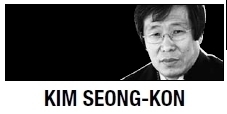A few days ago, I met a renowned expert on Chinese, Japanese and Korean relations. He was genuinely concerned about recent radical developments in East Asia: increasing Chinese and American rivalry as the former engages in territorial disputes; the sudden upswing of the right wing in Japan, and her alliance with America; and the conflicts between Korea and Japan over Dokdo island and the atrocities the latter committed during the colonial period.
In the expert’s eyes, South Korea was misunderstood and left isolated in the midst of this maelstrom because of her complicated relationships with the three countries. He was worried about Korea’s deteriorating relationship with Japan, gradual detachment from the U.S. and increasing tendency to lean toward China.
The expert and I agreed on many things. For example, we agreed that that as a peninsula, Korea should function as a mediator not only between China and Japan, but also between continental and oceanic nations. Otherwise, Korea might unwittingly end up being caught in the crossfire between Zeus and Poseidon. We agreed that Korea should maintain balance at all times in the fatefully precarious rivalry between continental and oceanic nations. But how should we go about this? The answer eluded us because it involved delicate, complex diplomacy at which we were not good.
The expert and I also agreed that South Korea was able to survive thanks to American intervention in 1945 and 1950. Otherwise, there would have been no South Korea today; the whole peninsula would have become a communist outpost. At that time, we did not choose our allies; they came to us inadvertently. Once the Cold War ended, we thrived thanks to the export-oriented economy we pursued, capitalizing on our diligence, advanced technology and cultural prosperity in the form of the Korean Wave.
Now, we seem to be at the onset of a Second Cold War because of the unprecedented rivalry between China and America. This time around, we have to choose our ally. The problem is that in this triangular relationship, we will be in trouble no matter whom we choose. This is the dilemma that South Korea faces now. Indeed, China sometimes indirectly pushes us to commit ourselves only to her, while America suspects that we are flirting with China, abandoning a half-century-long relationship based on mutual trust.
What, then, is the best choice for Korea and what are we supposed to do in the vortex of the Second Cold War? No one can come up with a simple answer because the question involves a plethora of complex international political issues. Nevertheless, the most important thing is not to forget who our allies are. We are not supposed to turn our back on our allies under any circumstances. The next important thing is to maintain friendly relations with other countries and make them our friends, not enemies. It is unwise to have hostile countries near us because we cannot afford to lose support from our neighboring nations.
Perhaps, the art of diplomacy requires that we refrain from taking sides hastily while still putting forth our stance clearly. This does not mean that we should be meek or nebulous in our foreign policy. Neither does it mean that we should be hasty in showing our hand. Sometimes, we need to be clever and cunning in order to avoid unnecessary conflicts and clashes. Other times, we should boldly protest if a neighboring country attempts to interfere with our internal affairs. Moreover, we could use the precarious relationship between Japan, China and the States as a powerful leverage.
Unfortunately, Koreans are accustomed to binary oppositions and as a result, tend to see everything as two opposites, for example “us vs. them,” and “ally vs. enemy.” In foreign affairs, however, there is no such thing as an eternal enemy or an eternal ally. For example, when the Shah ruled Iran, the States and Iran were on good terms. When Ayatollah Khomeini ousted the Shah in 1979 and turned Iran into a fundamentalist Muslim country, the relationship became antagonistic, with the U.S. becoming friendly with Saddam Hussein’s Iraq instead. However, when Saddam turned into a tyrant, the relationship deteriorated, and the U.S. cozied up to Iran again.
When dealing with China and Japan, we should learn to use both the carrot and the whip dexterously if we are to earn their respect. If we feed carrots to one and apply the whip to another, the outcome will be disastrous. The expert remarked that in order to be esteemed by our neighboring countries it was essential that we build a strong nation. If we continue to antagonize each other, sharply divided into the Left and the Right, we will never be able to build a mighty nation. Before losing any more respect and ruining our future, we should stop our ideological brawls immediately and become a shrewd diplomat in order to survive and thrive in the vertiginous whirlwind of the looming Second Cold War.
By Kim Seong-kon
Kim Seong-kon is a professor emeritus of English at Seoul National University and president of the Literature Translation Institute of Korea. -- Ed.





![[Weekender] How DDP emerged as an icon of Seoul](http://res.heraldm.com/phpwas/restmb_idxmake.php?idx=645&simg=/content/image/2024/04/25/20240425050915_0.jpg&u=)
